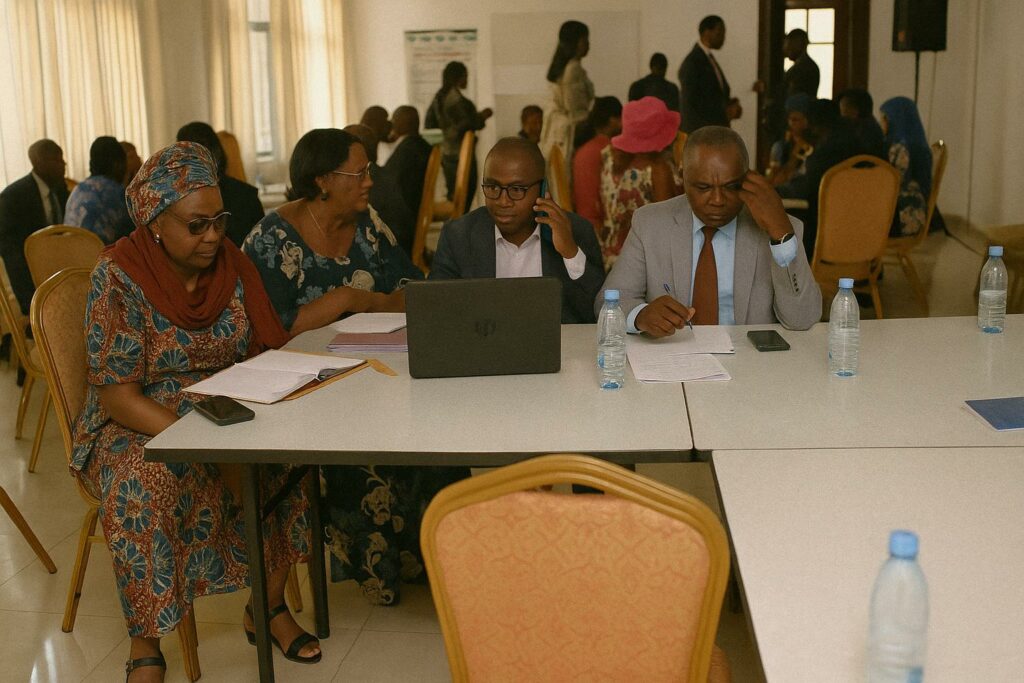Brazzaville renews its attention to agro-skills
By formally validating a comprehensive skills-development strategy for agriculture, the Republic of Congo signals a deliberate pivot from raw-material dependence toward value-added rural productivity. The document, produced under the Integrated Agricultural Value Chain Development Project (Prodivac) financed by the African Development Bank, was endorsed in late June after months of iterative consultations. Senior civil servant Pascal Robin Ongoka, speaking for Minister of Agriculture, Livestock and Fisheries Paul Valentin Ngobo, praised the ‘co-construction approach that places expertise, not ideology, at the centre of policy design’. Such phrasing reflects Brazzaville’s wider effort to project technocratic stability and to reassure investors, diplomats and multilateral lenders that agricultural modernisation is advancing on a consensual footing.
Anatomy of the STED methodology in a Congolese setting
The backbone of the new blueprint is the ILO’s Skills for Trade and Economic Diversification (STED) analytical framework, deployed in Congo between October and November 2024. STED cross-checks labour-market demand with training-supply data to identify competency gaps and forecast emerging professions. According to Gloria Oket Ondako, who coordinates Prodivac and represents the ILO in Brazzaville, the exercise ‘places actionable evidence at the fingertips of decision-makers and removes guesswork from curriculum reform’ (ILO STED guidelines 2023). The resulting matrix classifies 130 occupations across the manioc, maize and poultry subsectors, flagging acute shortages in post-harvest technology, phytosanitary control and agribusiness management. These insights resonate with the government’s ambition to substitute expensive imports—estimated at 600 million USD annually—with domestically processed staples.
Stakeholder diplomacy and the calculus of consensus
The workshop that culminated in the strategy’s validation assembled employer confederations, trade-union federations, United Nations agencies and provincial training institutes. Observers note that such an inclusive architecture conforms to President Denis Sassou Nguesso’s preference for ‘dialogue-based governance’ articulated in his 2021 electoral platform. Beyond symbolism, the presence of multiple actors helps pre-empt critiques of top-down planning and ensures that the eventual retooling of curricula—from vocational schools in Ouesso to agronomic faculties in Dolisie—mirrors labour-market realities. Representatives of the Congolese Employers Union, for instance, lobbied successfully for a stronger emphasis on entrepreneurship modules, arguing that micro- and small-scale agro-processors are still the backbone of rural employment.
Anticipated gains for food security and export revenue
Government analysts calculate that narrowing the skills gap could lift agricultural output growth by 3.2 percentage points per annum over the next five years, a projection echoed by AfDB economists (African Development Bank 2024). If realised, such momentum would dovetail with the National Development Plan 2022-2026, which assigns agriculture a central role in diversifying GDP away from hydrocarbons. Enhanced capacity in processing manioc into high-quality flour or maize into fortified feed is expected to cut food-import bills and open niche export corridors toward neighbouring Gabon and the Democratic Republic of Congo. The plan also positions Congo to tap into the African Continental Free Trade Area, provided logistics bottlenecks along the Pointe-Noire-Brazzaville corridor are alleviated.
Navigating implementation challenges with pragmatic optimism
Yet even the most sophisticated strategy is hostage to execution. Financing tailored training modules, modernising equipment in rural colleges and retaining qualified instructors require sustained fiscal commitment. The Ministry of Finance has hinted at earmarking part of the projected savings from fuel-subsidy rationalisation for human-capital investments, a move applauded by international partners. On the private-sector side, commercial banks remain cautious: only 4 percent of their loan portfolios target agriculture, mainly short-term trade credit. AfDB’s partial-risk guarantees and the World Bank’s forthcoming Agriculture Resilience Project could help de-risk lending, but domestic regulatory reforms—particularly on collateral and warehouse receipts—will matter just as much.
Strategic significance for Central African geoeconomics
For regional observers, Congo’s agro-skills blueprint is more than a technical deliverable: it is a statement of intent within Central Africa’s fluid geoeconomic theater. Cameroon and Rwanda have already leveraged similar skills audits to climb agribusiness value chains, and Kinshasa has launched its own STED assessment with ILO backing. In this competitive environment, Brazzaville’s timely validation may allow it to secure a first-mover advantage in specialised segments such as starch derivatives and climate-smart livestock feed. Moreover, the initiative meshes with Congo’s commitments under the African Union’s Comprehensive Africa Agriculture Development Programme, allowing the government to court additional concessional financing while showcasing progress on Agenda 2063 benchmarks.
A calibrated roadmap for inclusive rural transformation
The newly approved document stops short of promising overnight miracles, yet it offers a calibrated roadmap that blends evidence-based training reforms, targeted investment incentives and cross-ministerial coordination. By anchoring the process within international best practice and local ownership, Brazzaville enhances both legitimacy and operational clarity. As implementation unfolds, periodic monitoring—already scheduled for January 2026—will test the robustness of the approach. For now, the strategy reinforces the perception that Congo’s leadership is intent on translating macroeconomic aspirations into granular, field-level action, thereby enlarging the country’s room for manoeuvre in conversations with donors, investors and its own citizens.

